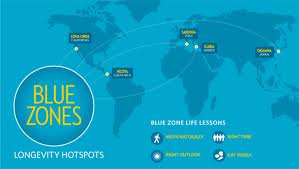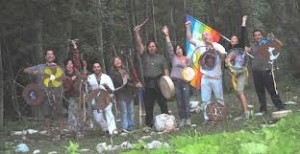Il ricercatore Dan Buettner ha viaggiato in tutto il mondo incontrando le persone più longeve del pianeta, e ha imparato nove lezioni, semplici ma efficaci, che potrebbero farvi iniziare un percorso di vita che favorisce la longevità. Dove li ha trovati? Nelle Zone Blu. Cos’è una Zona Blu? È un’area dove una percentuale più alta della popolazione vive incredibilmente a lungo. Buettner percorre le quattro Zone Blu del mondo: la Sardegna, in Italia; Okinawa, in Giappone; Loma Linda in California e la Penisola di Nicoya, nel Costa Rica. 
Buettner scopre come queste popolazioni riescano a vivere meglio e più a lungo senza ricorrere a pillole, alla chirurgia o ai farmaci.
Queste sono le nove lezioni di vita ovvro i nove principi della sana longevità:
1. REGOLA DELL’ 80%
2. IL POTERE DELLE PIANTE (+VEGETALI e – PRODOTTI INDUSTRIALI)
3. VINO ROSSO (coerenza e moderazione)
4. PROGRAMMA DI VITA (per quale progetto siamo stati creati?)
5. CREDENZE (partecipazione a valori spirituali)
6. DOWN SWIFT (lavorare meno, rallentare, riposare)
7. MUOVERSI (attività fisica imprenscindibile)
8. APPARTENERE (formare una sana relazione sociale)
9. SENSO DI INTERDIPENDENZA: LA COMUNITA’ (fare della famiglia e della tribù una priorità)
Come si può notare solo i primi 3 punti riguardano l’alimentazione; il resto riguarda lo stile di vita con particolare riferimento alla spiritualità della persona. Ecco comunque i nove punti come esattamente descritti da Dan Buettner:
 1. Move Naturally
The world’s longest-lived people don’t pump iron, run marathons or join gyms. Instead, they live in environments that constantly nudge them into moving without thinking about it. They grow gardens and don’t have mechanical conveniences for house and yard work.
1. Move Naturally
The world’s longest-lived people don’t pump iron, run marathons or join gyms. Instead, they live in environments that constantly nudge them into moving without thinking about it. They grow gardens and don’t have mechanical conveniences for house and yard work.
2. Purpose. The Okinawans call it “Ikigai” and the Nicoyans call it “plan de vida;” for both it translates to “why I wake up in the morning.” Knowing your sense of purpose is worth up to seven years of extra life expectancy
 3. Down Shift
Even people in the Blue Zones experience stress. Stress leads to chronic inflammation, associated with every major age-related disease. What the world’s longest-lived people have that we don’t are routines to shed that stress. Okinawans take a few moments each day to remember their ancestors, Adventists pray, Ikarians take a nap and Sardinians do happy hour.
3. Down Shift
Even people in the Blue Zones experience stress. Stress leads to chronic inflammation, associated with every major age-related disease. What the world’s longest-lived people have that we don’t are routines to shed that stress. Okinawans take a few moments each day to remember their ancestors, Adventists pray, Ikarians take a nap and Sardinians do happy hour.
 4. 80% Rule
“Hara hachi bu” – the Okinawan, 2500-year old Confucian mantra said before meals reminds them to stop eating when their stomachs are 80 percent full. The 20% gap between not being hungry and feeling full could be the difference between losing weight or gaining it. People in the Blue Zones eat their smallest meal in the late afternoon or early evening and then they don’t eat any more the rest of the day.
4. 80% Rule
“Hara hachi bu” – the Okinawan, 2500-year old Confucian mantra said before meals reminds them to stop eating when their stomachs are 80 percent full. The 20% gap between not being hungry and feeling full could be the difference between losing weight or gaining it. People in the Blue Zones eat their smallest meal in the late afternoon or early evening and then they don’t eat any more the rest of the day.
5. Plant Slant Beans, including fava, black, soy and lentils, are the cornerstone of most centenarian diets. Meat—mostly pork—is eaten on average only five times per month. Serving sizes are 3-4 oz., about the size of deck or cards.
6. Wine @ 5 People in all Blue Zones (except Adventists) drink alcohol moderately and regularly. Moderate drinkers outlive non-drinkers. The trick is to drink 1-2 glasses per day (preferably Sardinian Cannonau wine), with friends and/or with food. And no, you can’t save up all weekend and have 14 drinks on Saturday.
7. Belong
All but five of the 263 centenarians we interviewed belonged to some faith-based community. Denomination doesn’t seem to matter. Research shows that attending faith-based services four times per month will add 4-14 years of life expectancy. 
8. Loved Ones First Successful centenarians in the Blue Zones put their families first. This means keeping aging parents and grandparents nearby or in the home. (It lowers disease and mortality rates of children in the home too.) They commit to a life partner (which can add up to 3 years of life expectancy) and invest in their children with time and love. (They’ll be more likely to care for you when the time comes).
 9. Right Tribe
The world’s longest lived people chose–or were born into–social circles that supported healthy behaviors, Okinawans created ”moais”–groups of five friends that committed to each other for life. Research from the Framingham Studies shows that smoking, obesity, happiness, and even loneliness are contagious. So long-lived people’s health behaviors have been favorable shaped by their social networks.
9. Right Tribe
The world’s longest lived people chose–or were born into–social circles that supported healthy behaviors, Okinawans created ”moais”–groups of five friends that committed to each other for life. Research from the Framingham Studies shows that smoking, obesity, happiness, and even loneliness are contagious. So long-lived people’s health behaviors have been favorable shaped by their social networks.
To make it to age 100, you have to have won the genetic lottery. But most of us have the capacity to make it well into our early 90’s and largely without chronic disease. As the Adventists demonstrate, the average person’s life expectancy could increase by 10-12 years by adopting a Blue Zones lifestyle.

